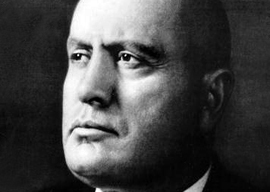
September 23, 2016

Benito Mussolini
Source: Wikimedia Commons
He isn”t a Fascist either, though there are Fascist aspects to his regime. Nevertheless the 20th-century figure he most resembles is Mussolini. He presents us with the same Strong Man image, and the resemblances are both personal and political. Like Mussolini he likes to be photographed stripped to the waist engaging in manly exercises, riding a horse, swimming, playing with dogs or lion cubs, or, in Mussolini’s case, helping bring in the harvest. Like the Duce, he has cemented his power by his mastery of communication. Mussolini was a superb orator, delivering inspiring public speeches to vast crowds from the balcony of the Palazzo Venezia in Rome and in other city centers. Putin uses television with comparable skill. Mussolini summoned the people into the piazza, Putin speaks to his people in their own homes. In both cases what is sought and achieved is a direct line to the nation.
Mussolini was the supreme showman. The diplomat and journalist Luigi Barzini called him “the tenor” singing a song Italians loved to hear. The style is different today, but Putin likewise gives Russians a tune that pleases them. Mussolini’s rash and stupid decision to enter the Second World War as an ally of Hitler was his undoing; war revealed the Fascist regime as a ramshackle thing that presented only the appearance of a Great Power; it was a Potemkin village, an impressive facade with nothing behind it. So Mussolini was found out, more the Wizard of Oz than a great statesman and leader. In 1943 the regime collapsed like a house of cards.
Putin, unchallenged at home, continues to ride high. His really quite small-scale military adventures in Georgia, Ukraine, and now Syria seem to indicate, as Churchill said of Mussolini, “the path that a nation can follow when courageously led”; they win him the admiration of foreign nationalists contemptuous of their own leaders” timidity. This, it seems to them, is what can be achieved by a leader concerned only with his own national interest and contemptuous of the opinion of wet foreign liberals. But Mussolini’s Italy was never a Great Power; it merely put on the show of being one. In reality it was a poor and economically backward country, run by a corrupt and brutal party with no respect for law. Putin’s Russia is in a similar condition, a state looted by the ruling class and corrupt oligarchs, a country with an unbalanced economy and dire demographic statistics.
Ernest Hemingway, as a young foreign correspondent, saw through Mussolini even while the statesmen of the democracies were applauding him; he called the Duce “the biggest bluff in Europe.” Is Vladimir Putin the biggest bluff in Europe today? If he proves to be so, the Western nationalists who now praise him will look as silly as those who were taken in by Mussolini, as wrong as those who for diverse reasons found so much to admire and even revere in Hitler and Stalin. Power worship is understandable because power is dazzling. But when your eyes are dazzled, you see nothing clearly, nothing for what it truly is.